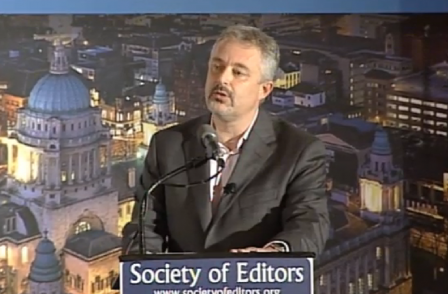
Sun investigations editor Brian Flynn has warned that the fear of arrest is stopping journalists from pursuing public interest stories provided by public sector whistle-blowers.
And he warned that if the Government opts to impose some form of statutory regulation on journalism in the UK it will plunge public interest investigations into “a new ice age”.
Addressing the final session of the Society of Editors conference in Belfast this morning, Flynn said that the Leveson Inquiry had already had a significant chilling effect on freedom of speech in the UK: “It sometimes feels like I am working in a butchers’ deep freeze rather than a newsroom”.
He said: “Every day The Sun turns away stories that are in the public interest because of the 2010 Bribery Act. With no public interest defence we cannot talk to whistleblowers who want compensation for the risk they are taking."
Some 20-plus Sun journalists have been arrested so far in the last year as a result of police investigations into inappropriate payments for stories.
Flynn said: “So many decent journalists have been arrested under a 1906 act [The Prevention of Corruption Act] that was never applied to journalists before. It was so obscure that none of us had even read about it in our bible MacNae’s Law for Journalists.”
He said that journalists are now unwilling to investigate public interest stories which might involve breaking the law because: “It might result in a 6.30am knock at the door and police officers rummaging through your wife’s knicker drawer while your children throw up in fear.”
Flynn cited the example of a Sun investigation two years ago which involved secret filming at Parkhurst Prison. The story exposed a blackmail revenge plot which could have seen a violent criminal freed. As a result of The Sun’s investigation the man was sentenced to a further two years in prison.
Flynn said: “I had to stand up in Portsmouth Crown Court and confirm on oath that I had broken the law by filming inside a prison. The judge and police rightly backed us because what I did was in the public interest…Do you think we would even consider conducting that investigation now?”
Flynn said the cost of dealing with “vexatious” PCC complaints under the current system of press regulation was already putting a strain on resources. He said that he had to deal with a 30-page complaint which took him six days when he exposed a Ukrainian far-right paramilitary group with undercover filming in the run-up to this year's Euro 2012 football tournament.
Concluding with a swipe at those who favour some form of statute-backed regulation of the press, he said: “If the state is given the power to oversee or limit our work it could bring about a new ice age where the most important work we do is gone forever.”
Email pged@pressgazette.co.uk to point out mistakes, provide story tips or send in a letter for publication on our "Letters Page" blog
